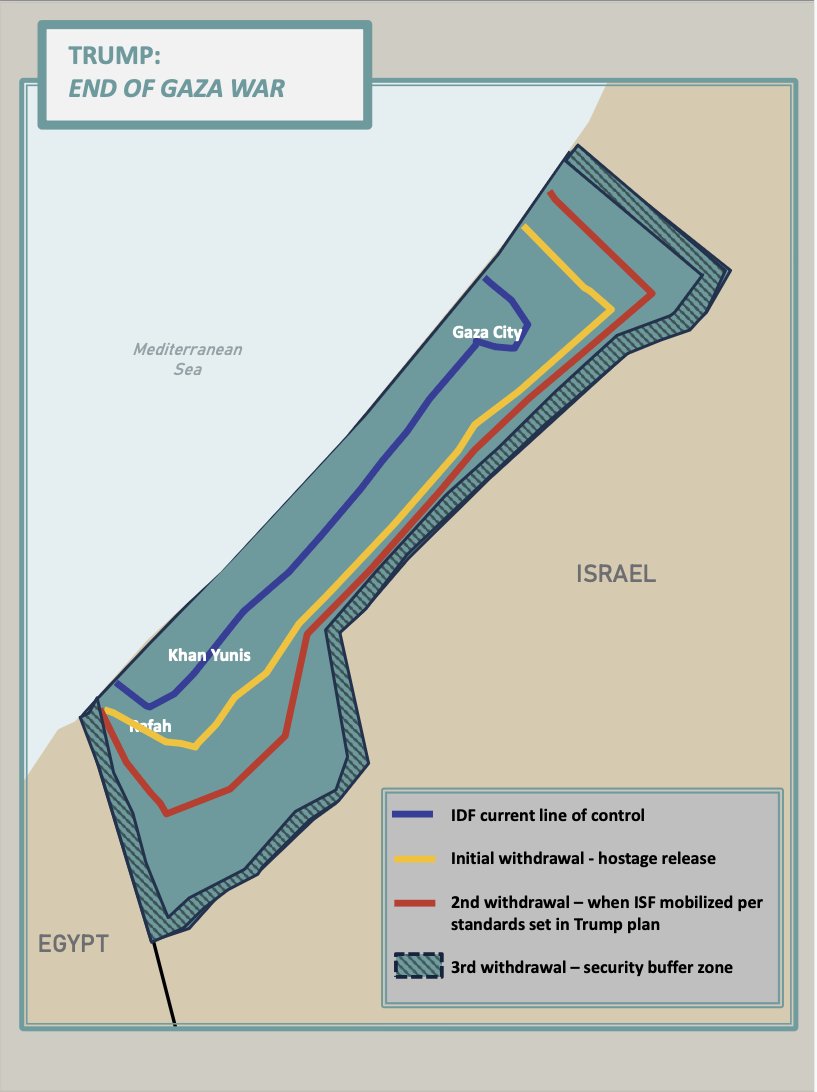


As noted by President Trump during his remarks about the regional state leaders requesting that he personally head the “Gaza Board of Peace,” it is only USA President Trump the regional stakeholder’s trust.
Together with the USA and Israel, Egypt, Saudi Arabia, Turkey, the UAE and Qatar have tentatively constructed a ceasefire and peace plan that is contingent upon President Trump as the fulcrum to balance all interests. This puts President Trump in an exceptionally important position. This balance is also why only Donald Trump can pull this off.
As the difficult challenge begins, the preliminary objectives – the ‘how to do this‘ – aspect starts to surface. As noted by the Associated Press, President Trump is sending 200 experts in transportation, planning, security, logistics and engineering from the U.S. military to frame out a “civil-military coordination center” in Israel.
The coordination center will include partner nations, nongovernmental organizations and private-sector experts. The regional states will supplement and support the center as the transitional hub for immediate reconstruction and humanitarian aid. It is likely President Trump will need to select and appoint members to the Gaza Board of Peace as this coordination center gets up and running.
As this process unfolds, Israeli President Benjamin Netanyahu is likely to get angered by a predictable stiff-arm from President Trump. The regional stakeholders will be watching this dynamic closely. Domestically, this will be very interesting to watch play out.
WASHINGTON (AP) — The United States is sending about 200 troops to Israel to help support and monitor the ceasefire deal in Gaza as part of a team that includes partner nations, nongovernmental organizations and private-sector players, U.S. officials said Thursday.
The officials, who spoke on condition of anonymity to discuss details that were not authorized for release, said U.S. Central Command is going to establish a “civil-military coordination center” in Israel that will help facilitate the flow of humanitarian aid as well as logistical and security assistance into the territory wracked by two years of war.
The remarks provide some of the first details on how the ceasefire deal would be monitored and that the U.S. military would have a role in that effort.
After Israel and Hamas agreed to the first phase of a Trump administration plan to halt the fighting, a litany of questions remain on next steps, including Hamas disarmament, a withdrawal of Israeli forces from Gaza and a future government in the territory.
One of the officials said the new team will help monitor implementation of the ceasefire agreement and the transition to a civilian government in Gaza. (read more)
The predictable response from domestic U.S-Israel interests is likely to follow the same pattern we see unfolding in the recent decision by the Dept of Defense to help train Qataris on the F-15 purchase.
(Via MJUltra) “The U.S. and Qatar signed an agreement to establish a Qatari Emiri Air Force training facility at Mountain Home Air Force Base, Idaho, for joint training with Qatari F-15 jets and pilots, leveraging Qatar’s role in peace talks and prior defense deals.”
The Dept of War has authorized Qatar to build a training facility at Mountain Home Air Force Base, Idaho. This is not a Qatari base in the U.S, but rather a hosted training contingent under U.S. military control.
This is similar to the Tyndall Air Force base in Florida where Qatar military already trains, or to Singapore’s F-15 training at Mountain Home, Idaho, since 2009, or the Dutch F-16 training facility in New Mexico. This is not an unusual set up as it permits training while the Dept of War can control strategic tech and intel systems at home.
Qatar’s massive $12 billion F-15 purchase requires U.S-based training and Mountain Home’s infrastructure suits this need perfectly. The joint training is routine. The bottom line is the joint Qatar-U.S. training facility is not controversial; however, domestically the voices of Israeli influencers are already going bananas.


